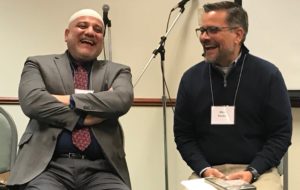Sixty-five Baptists and Muslims met April 16-19 to discuss ways to unite churches and mosques in communities to foster interfaith understanding, promote religious liberty and cooperate for common good.
Planners for the third national Baptist/Muslim dialogue at Green Lake Conference Center/American Baptist Assembly in Green Lake, Wis., invited Baptist and Muslim leaders under age 50 interested in establishing ongoing relationships between congregations.

Imam Imad Enchassi and Baptist minister Mitch Randall enjoy each other’s company in photo from third national Baptist/Muslim dialogue shared on social media.
While beyond the target age, retired seminary professor Richard P. Olson called the gathering “a striking contrast to the Islamophobic rants so prevalent in our society.”
Leaders from the Islamic Society of North America, American Baptist Churches USA, Cooperative Baptist Fellowship and the Alliance of Baptists joined to organize the first Baptist/Muslim dialogue in 2009. It responded to “A Common Word between Us and You,” a letter signed by 138 Muslim scholars declaring, “The future of the world depends on peace between Muslims and Christians.”
That year about 100 Baptists and Muslim leaders gathered in Boston to draft a “Statement of our Common Will,” pledging to fight stereotypes, educate faith communities about common values and cooperate on projects that contribute to justice, peace and the common good.
A second national conference and three regional conferences followed in 2012, featuring speeches from Suzan Johnson Cook, President Obama’s ambassador-at-large for international religious freedom, and Rashad Hussain, Obama’s Special envoy to the Organization of Islamic Cooperation.
The most recent gathering gave participants a chance to build relationships, discuss barriers to interfaith work and the underpinnings of religious liberty common to both traditions and plan to apply the learnings upon returning home.
For Susan Sparks, a preacher for one of the worship sessions, it “offered a tiny glimpse of what the world could be — a place of mutual respect, a gathering full of curiosity and learning, a celebration of our shared humanity.”
“I pray that the dialogue continues, for Baptists and Muslims, and for all faith traditions, so that one day soon this model of friendship becomes a global reality and not just a fleeting glimmer of possibility,” Sparks, pastor of the Madison Avenue Baptist Church in New York City, told American Baptist News Service.
Kathy Pickett, pastor of Prairie Baptist Church in Kansas City, called it “a wonderful example of God’s uniting, neighborly love.”
Mitch Randall, executive director of the Baptist Center for Ethics, joined Imam Imad Enchassi of the Islamic Society of Greater Oklahoma City to share how they supported each other for several years while Randall was pastor of CBF-affiliated NorthHaven Church in Norman, Okla.
Randall said in a workshop one lesson he learned is that he and the imam are not “in competition” to win souls. “We are in competition together to stamp out hate, to promote love, to achieve peace,” he said.
If there is one thing he has taught me over the last 10 years, it is that Islam is a religion and faith of peace,” Randall said of his imam friend. “It’s been a little harder to convince him that Christianity is, but I think I’m about there.”
Travis Adams, associate pastor of students and missions at Third Baptist Church in St. Louis, Mo., said in a CBF blog that “no conversions were made after half a week of dialogue” but he came away feeling “less concerned about theology than the urgent need to orient our community toward valuing being compassionate over being right.”
Sponsoring bodies for the third national dialogue between Baptists and Muslims included American Baptist Churches USA, Cooperative Baptist Fellowship, Lott Carey Baptist Foreign Mission Society, Progressive National Baptist Convention, National Baptist Convention of America International, Alliance of Baptists and Canadian Baptist Ministries.
